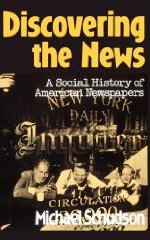Objectivity, a mainstay to modern journalism, was not always present in early American newspapers — nor was it expected. “Discovering the News: A Social History of American Newspapers” considers objectivity’s role in American newspapers from the early days of the Penny Press to the 1970’s.
 Author Michael Schudson‘s introduction lays the groundwork for what will become the emergence and expectation of objectivity in American newspapers. Schudson focuses the development of objectivity around one of journalism’s greatest newsworthy subjects — war.
Author Michael Schudson‘s introduction lays the groundwork for what will become the emergence and expectation of objectivity in American newspapers. Schudson focuses the development of objectivity around one of journalism’s greatest newsworthy subjects — war.
Pre-World War I (Definition of objectivity: “Facts are not human statements about the world, but aspects of the world itself.”)
Partisanship was standard fare in early American papers. News centered on political speeches and later focused on sensationalism. Schudson address the idea that the Associated Press might be credited with the rise of objectivity in journalism. However, he refutes this idea stating, “into the first decades of the twentieth century…it was uncommon for journalists to see a sharp divide between facts and values.”
Post-World War I (Definition of objectivity: “Allegiance to rules and procedures created for a world in which even facts were in question.”)
Schudson attributes the rise of objectivity to propaganda and public relations during WWI. Reporters began questioning the facts. They began to think the facts they reported were constructed for them by the government and public relations companies. Schudson states, “one response to this discomfiting view was the institutionalization in the daily paper of new genres of subjective reporting, like the political column.”
Post-World War II (Definition of objectivity: “A faith in ‘facts,’ a distrust of ‘values,’ and a commitment to their segregation.”)
Government interference, or as Schudson phrases it “government management,” began during World War I and played an ever increasing role after World War II. Journalists also grew suspect of an “imperial presidency after World War II.” During the Vietnam War, there was the growth of what Schudson refers to as the “adversary culture,” which affected not only reporters, but also the government and the nation as a whole.
Schudson’s Advice Concerning Objectivity
“Journalists, like other seekers, must learn to trust themselves and their fellows and the world enough to take everything in, while distrusting themselves and others and the appearances of the world enough not to be taken in by everything.”

Leave a response